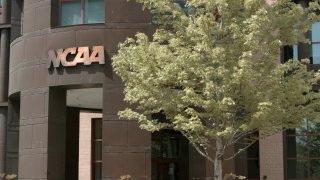
A wrongful death lawsuit brought against the NCAA by the 58-year-old widow of former USC football player should be dismissed, defense lawyers argue new court papers that state the plaintiff's attorneys have failed to show a link during trial between her husband's death and the organization's conduct.
Alana Gee sued the NCAA in Los Angeles Superior Court in November 2020 for allegedly failing to protect her late spouse, Matthew Gee, from repetitive head trauma. Opening statements in trial of the plaintiff's suit took place before a jury and Judge Terry Green on Oct 21.
Matthew Gee died in 2018 at age 49, allegedly from permanent brain damage caused by countless blows to the head he took while playing linebacker for the 1990 Rose Bowl-winning team. But NCAA attorneys blame Gee's death on alcohol and drug abuse as well as other health problems.
Get Southern California news, weather forecasts and entertainment stories to your inbox. Sign up for NBC LA newsletters.
"(Gee) contends a long chain of causal links caused Matthew Gee's death,'' NCAA attorneys state in their court papers filed Thursday seeking a mid-trial dismissal of the plaintiff's case.
Gee alleges that the NCAA unreasonably increased the risk of head injuries inherent in collegiate football, which led to her husband developing chronic traumatic encephalopathy, a brain condition thought to be caused by head blows, leading to his substance abuse and ultimate death. But NCAA attorneys say her theory fails at multiple points, based on evidence she has presented so far during trial of her case.
"Working backwards from Gee's death, (Gee) did not show that CTE led to Matthew Gee's substance abuse,'' the NCAA lawyers maintain in their court papers. "(Gee) also did not show that Gee developed CTE from anything he
experienced playing collegiate football.''
The NCAA attorneys further state in their court papers that Gee has not shown that any NCAA action or inaction unreasonably increased the inherent risks of collegiate football, let alone that any NCAA action or inaction caused Matthew Gee's death.
The attorneys also are asking for dismissal of Gee's punitive damages claim, arguing her attorneys have not shown that anyone connected with the NCAA, including any officer director or managing agent, demonstrated malice, oppression or fraud.
"There was simply nothing showing that any particular individual at the NCAA acted with the requisite level of conscious disregard and willful misconduct,'' the NCAA attorneys state in their court papers.
No date has been set to hear the NCAA's dismissal motion.
A 2018 trial in Texas led to a swift settlement after several days of testimony by witnesses for the widow of Greg Ploetz, who played defense for the University of Texas in the late 1960s and died in 2015 at age 66.
In 2016, the NCAA agreed to settle a class action concussion lawsuit, paying $70 million to monitor former college athletes' medical conditions, $5 million toward medical research and payments of up to $5,000 toward individual players claiming injuries.



